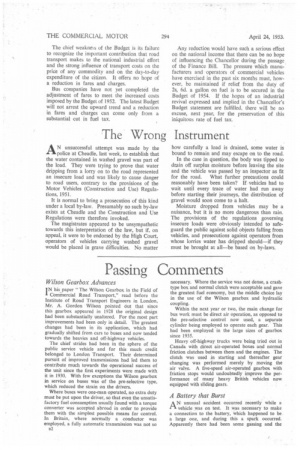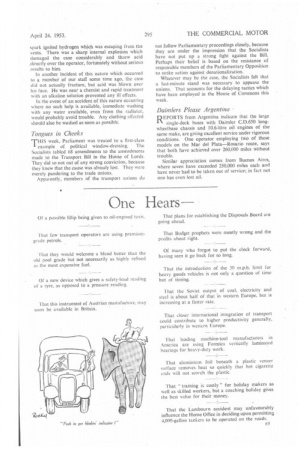Passing Comments
Page 36

Page 37

If you've noticed an error in this article please click here to report it so we can fix it.
Wilson Gearbox Advances
I N his paper "The Wilson Gearbox in the Field of Commercial Road Transport," read before the Institute of Road Transport Engineers in London, Mr. A. Gordon Wilson pointed out that since this gearbox appeared in 1928 the original design had been substantially unaltered. For the most part improvements had been only in detail. The greatest changes had been in its application, which had gradually shifted from cars to buses and now tended towards the heavies and off-highway vehicles.
The chief strides had been in the sphere of the public service vehicle and for this much credit belonged to London Transport. Their determined pursuit of improved transmissions had led them to contribute much towards the operational success of the unit since the first experiments were made with it in 1930. With few exceptions the Wilson gearbox in service on buses was of the pre-selective type, which reduced the strain on the drivers.
Where buses were one-man operated, no extra duty must be put upon the driver, so that even the unsatisfactory fuel consumption usually found with a torque converter was accepted abroad in order to provide them with the simplest possible means for control. In Britain, where normally a conductor was employed, a fully automatic transmission was not so necessary. Where the service was not dense, a crashtype box and normal clutch were acceptable and gave the greatest fuel economy, but the middle choice lay in the use of the Wilson gearbox and hydraulic coupling.
Within the next year or two, the main change for bus work must be direct air operation, as opposed to the pre-selective control now used, a separate cylinder being employed to operate each gear. This had been employed in the large sizes of gearbox since 1935.
Heavy off-highway trucks were being tried out in Canada with direct air-operated boxes and normal friction clutches between them and the engines. The clutch was used in starting and thereafter gear changing was performed merely by moving the air valve. A five-speed air-operated gearbox with friction stops would undoubtedly improve the performance of many heavy British vehicles now equipped with sliding gears.
A Battery that Burst
AN unusual accident occurred recently while a vehicle was on test. It was necessary to make• a connection to the battery, which happened to be a large one, and during this a spark occurred. Apparently there had been some gassing and the
spark ignited hydrogen which was escaping from the vents. There was a sharp internal explosion which damaged the case considerably and threw acid ,directly over the operator, fortunately without serious results to him.
In another incident of this nature which occurred to a member of our staff some time ago, the case did not actually fracture, but acid was blown over his face. He was near a chemist and rapid treatment with an alkaline solution prevented any ill effects.
In the event of an accident of this nature occurring where no such help is available, immediate washing with any water available, even from the radiator, would probably avoid trouble. Any clothing affected should also be washed as soon as possible.
Tongues in Cheeks
THIS week, Parliament was treated to a first-class
example of political window-dressing. The Socialists tabled 68 amendments to the amendments made to the Transport Bill in the House of Lords. They did so not out of any strong conviction, because they knew that the cause was already lost. They were merely pandering to the trade unions.
Apparently, members of the transport unions do not follow Parliamentary proceedings closely, because they are under the impression that the Socialists have not put up a strong fight against the Bill. Perhaps their belief is based on the resistance of responsible members of the Parliamentary Opposition to strike action against denationalization.
Whatever may be the case, the Socialists felt that a last-minute stand was necessary to appease the unions. That accounts for the delaying tactics which have been employed in the House of Commons this week.
Daimlers Please Argentina
REPORTS from Argentina indicate that the large single-deck buses with Daimler C.D.650 longwheelbase chassis and 10.6-litre oil engines of the same make, are giving excellent service under rigorous conditions. One operator employing two of these models on the Mar del Plata—Rosario route, says that both have achieved over 260,000 miles without trouble.
Similar appreciation comes from Buenos Aires, where seven have exceeded 250,000 miles each and have never had to be taken out of service; in fact not one has even lost oil.




































































































